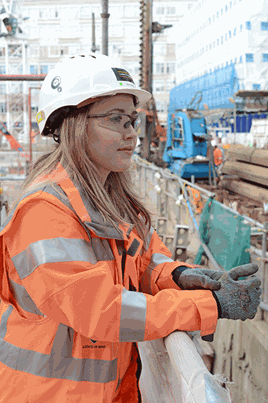Crossrail is not only on course to transform travel across London, it is also committed to widening the career choices of women and young people.
On January 19, Rail Minister Claire Perry heralded Europe’s largest construction project for its achievements in tackling the gender imbalance that persists among those choosing engineering and construction as a profession (RAIL 793).
Women currently make up a third of the Crossrail workforce, placing it well ahead of the construction industry’s disappointingly low average of 20%, and ahead of the 16% who work in rail. The project has also generated more than 500 apprenticeships since 2012, making it one of the largest single points of entry for young talent - sorely needed in rail and the wider UK construction industry as both sectors manage an ageing workforce.
Crossrail has raised the bar by smashing stereotypes and embracing the maxim that being a woman is no barrier to working on a building site, while also offering an exciting career for school leavers.
Eroding the well-established reputation of the building site as an exclusive realm of the alpha male has been the goal of Crossrail’s partnership with Women into Construction - a not-for-profit organisation that promotes greater gender equality in UK construction. It runs alongside the Young Crossrail programme, which has sent apprentices and female role models to inspire students at 277 schools, colleges and universities along the Crossrail route.
One such role model is 19-year-old Zoe Conroy, recruited last September as a Technical Engineer Apprentice by Crossrail contractor Laing O’Rourke.
Having finished her schooling in Portugal, where she moved aged eight to follow her father’s career as a civil engineer, Zoe wanted a more vocational path into higher education than a full-time university course could offer.
Based at Crossrail’s construction site at Tottenham Court Road, she is on site for four days a week, and attends London South Bank University on day release to study for an HNC (Higher National Certificate) in engineering. After two years she will embark on a Bachelor’s degree before commencing a chartership to become a fully-fledged Chartered Engineer.
Her day job involves assisting the Site Engineer to conduct surveys, prepare for concrete pours and complete the daily construction report, as Tottenham Court Road moves closer to accepting its first services in December 2018. Some £1 billion is being spent here to build a new station 25 metres below ground, a new street-level ticket hall and interchange facilities with the existing London Underground station.
“I always wanted to go into engineering, so working on Crossrail has been a real bonus,” she says.
“All my friends read about and see Crossrail on the news, which is cool, and I suppose it is something to tell the grandkids about in 50 years’ time that I helped build it.
“When I first told my mates I was working in construction they didn’t believe me, and I even had to show them my site badge. They all asked why I was doing it, until I told them how exciting and busy it all is.
“I’m definitely bringing my parents and mates down here when it’s all finished. I might never get to work on something this big again.”
Sadly, the initial response of her friends is not an unusual one - only a small number of her peers currently identify construction as a viable or interesting occupation. She adds that her own aspirations probably owe more to her home environment, rather than to any eager promotion by careers advisors at school.
“My dad is a self-employed civil engineer, and he started out as an apprentice too, 30 years ago with O’Rourke. One of my younger brothers wants to be an electrician and the other would like to be in construction as well. My dad is very proud to have another engineer in the family.
“I was the only one from my class at school to choose this. People my age are not encouraged to consider it really, so there should be more talks at schools.”
Inspiring the next cohort of young people - and in particular young women - is precisely what Crossrail’s employment and equality strategies have set out to do, according to the project’s Talent and Resource Director Valerie Todd. It is a two-pronged blueprint to tackle the apparent apathy of young people and the dearth of women entering the sector.
















Login to comment
Comments
Andrewjgwilt1989 - 02/05/2016 21:25
Hopefully Crossrail "Elizabeth Line" should be finished and in full service in late 2019.